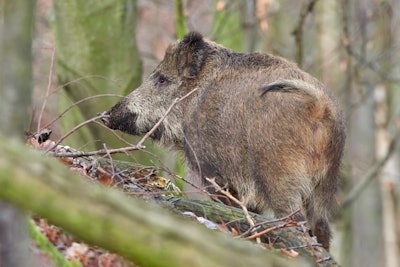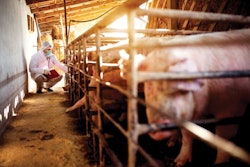
In a new revision to the national plan on wild boar control with the environment agency, the Norwegian Food Safety Authority is now aiming for the nationwide eradication of wild boar.
The agriculture ministry ordered this latest change in order to protect the country’s pig industry from African swine fever (ASF) through transmission from the wild population. Prompting the revision was the detection of the ASF virus in the municipality of Fagersta in neighboring Sweden.
On top of the measures already implemented in Norway, the authorities there will add the monitoring of wild boar and sales of their meat. Furthermore, fencing to contain movements of the wild population is under consideration. This could be located along part of the border with Sweden, as well as around sites attractive to the animals such as waste collection centers.
Furthermore, farmers with pigs kept outdoors will be required to erect a suitable barrier around their premises if there are wild boar nearby.
The two authorities state that the additional costs would be greatly exceeded by those of dealing with an ASF outbreak in the Norwegian pig sector.
The latest update from Sweden’s national veterinary institute SVA puts the number of confirmed ASF cases in that country’s wild boar at 62. All were found in a confined area near Fagersta, and the most recent case was identified in mid-November 2023. Ongoing surveillance has revealed no cases in wild boar outside the control zone, or in domestic swine.
Albania registers first ASF case in wild boar
As of February 17, the total number of ASF outbreaks in wild boar in Albania stood at 1,169.
This is according to the Animal Disease Information System from the European Commission (EC), which monitors notifiable animal diseases in European Union (EU) member states, and most adjacent countries.
As Albania has registered its first ASF case in this population, the number of countries with one or more cases since January 1 now stands at 20. This is the same figure as those with ASF cases during the whole of 2023, when the outbreak total reached just over 7,900 in this population
One of the Balkan states, Albania shares international borders with several states with ongoing ASF outbreaks in their wild and domestic pig populations.
According to the system, Italy has over the past two weeks overtaken Poland as the nation with the most outbreaks in this category with a total so far in 2024 of 245. As of this latest system update, Poland’s total had reached 240, followed by Bulgaria (193), Latvia (100), Hungary (86), Lithuania (84) and Hungary (78).
Totals for all of these countries have risen since the previous update dated February 9, as have those for Bosnia-Herzegovina, Croatia, Germany, Greece, North Macedonia, Romania, Serbia and Slovakia.
Furthermore, the total number of cases among Italian wild boar stands at 1,627. This is according to regional veterinary authority IZSAM (as of February 25).
This includes a net increase of 22 cases since the previous update, with additional cases in the regions of Emilia-Romagna, Liguria, Lombardy and Piedmont.
6 European states record new ASF cases in domestic pigs
Domestic pigs tested positive for the ASF virus in six states, according to reports received by the EC System in the period February 9-17.
As total outbreaks reached 52 for the year, there were a small number of additional cases in all five nations — namely Bosnia-Herzegovina, Greece, Romania, Serbia and Ukraine.
With a first outbreak in this population in North Macedonia, the number of affected states in 2024 has risen to six.
Based on more detailed notifications to the World Organisation for Animal Health (WOAH), recent outbreaks were confined to small and backyard pig herds in Bosnia-Herzegovina, Romania, Serbia and the Chernivtsi region of Ukraine.
View our continuing coverage of the global African swine fever situation.
















